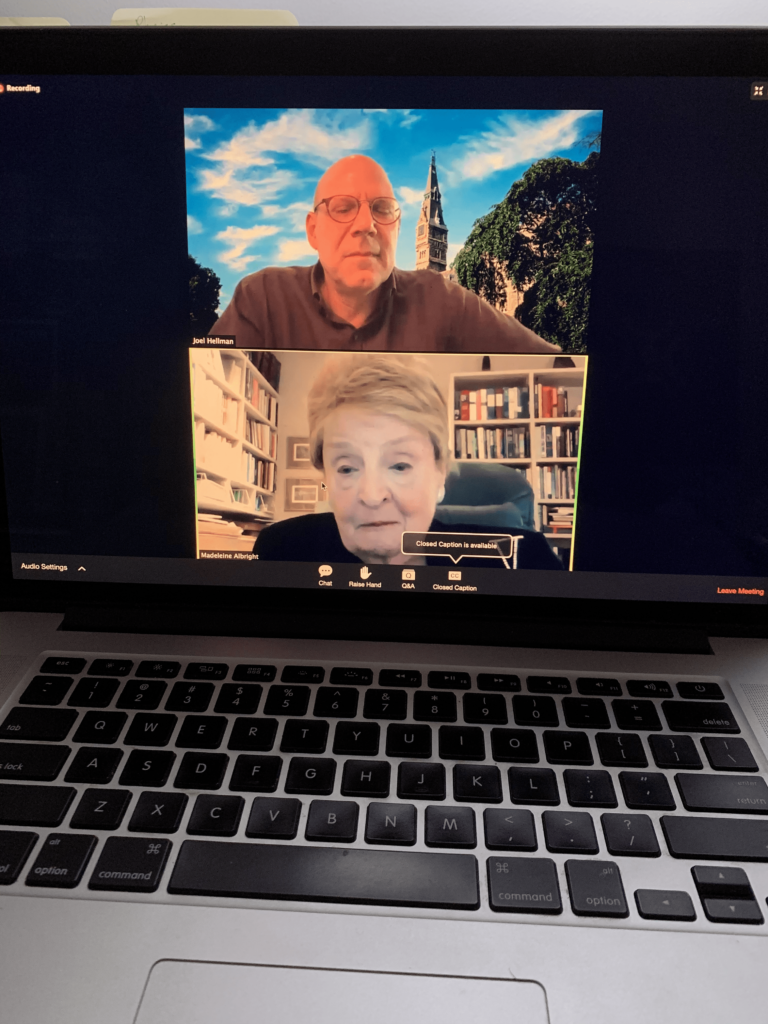The foreign service must promote diplomatic partnerships to respond to global crises like the COVID-19 pandemic, former Secretary of State Madeleine Albright said in a virtual book talk hosted by the School of Foreign Service over Zoom.

During the April 16 event, SFS Dean Joel Hellman interviewed Albright about her new book, “Hell and Other Destinations,” in which she reflects on her career as a diplomat and the role she has played in shaping foreign policy. Albright spoke about her career as secretary of state, her time as a professor at Georgetown University and the implications of the COVID-19 pandemic. Nearly 1,500 people tuned in to the virtual conversation.
Many issues facing the international community today, such as the COVID-19 pandemic, require greater diplomatic cooperation, according to Albright.
“We have to stop thinking we can tell everybody what to do all the time without any consultation. We have to understand that we need partnerships, especially to deal with the new kind of problems. Whether it’s a virus, climate change or nuclear proliferation, these are all issues that require partnerships,” Albright said. “As I tell my students, in order to be a good diplomat, you have to put yourself into the other person’s shoes and know what they need and not be into zero-sum solutions.”
COVID-19 has prompted international cooperation, with the group of 20 leading rich and developing nations launching the “Access to COVID-19 Tools Accelerator” initiative, which hopes to galvanize financial support against the coronavirus from the private and public sectors worldwide. The coronavirus outbreak was officially declared a pandemic by the World Health Organization in March. There are currently over 3 million cases in 210 countries and territories around the globe. The United States outpaces the rest of the world with over 1 million cases and over 50,000 deaths.
If Albright was still serving as secretary of state, she would prioritize gathering information about the pandemic to better inform the public and mitigate the coronavirus’ transnational effects, she said.
“I think one of the jobs of the secretary of state is to explain to the American public what is going on and why we have to help, and I would think the other foreign minister exes would do the same thing to understand the relationship between domestic and foreign policy,” Albright said. “The main problem is the coordination and how we have to operate together. Because as I said, the virus knows no boundaries.”
Albright, who has taken on many professions since serving as the United States’ first female secretary of state from 1997 to 2001, has served as an SFS faculty member since 1982. She currently is recognized as the Michael and Virginia Mortara Endowed Distinguished Professor in the Practice of Diplomacy.
Besides her latest book, Albright has authored six others, including her autobiography, “Madam Secretary: A Memoir”, “Read My Pins: Stories from a Diplomat’s Jewel Box” and “Fascism: A Warning”. She said people who have served as public servants should write about their careers.
“I do think that people that have been in office need to write about what they did,” Albright said. “I am often asked, ‘how do I want to be remembered?’ And I said, ‘I don’t. I’m still here.’ I wanted to talk about the things that I do and why I do them and how I learned from one thing to another.”
One important experience highlighted in “Hell and Other Destinations” is her time not only teaching but also learning from her students, according to Albright.
“I got my Ph.D. in order to be able to teach. I have enjoyed it very much, specifically at Georgetown,” Albright said. “I have a great deal of confidence in my students and I learn from them and I think that’s what is so energizing in the most incredible way.”
Every semester at Georgetown, Albright teaches the course “America’s National Security Tool Box,” which investigates necessary tools for current diplomats. At the end of the semester, students participate in an all-day simulation and develop a U.S. response to a foreign policy crisis. Instead of canceling the simulation because of the COVID-19 pandemic, Albright held it over Zoom and the class continued to role-play as United Nations, U.S. and Latin American diplomats to solve a military crisis in Venezuela.
Despite the grim outlook of the current pandemic, people should remain optimistic because today’s students are developing the skills to address international crises, according to Albright.
“We have no control ourselves over the virus. We do have control over our mood and I think we need to look toward what are the tools we can use not to have this kind of a situation,” Albright said. “I was thinking about this today as I was thinking about my students. In many ways, they are the ones that are going to be most capable to deal with this. In many ways, they are the ones now that understand the technology and what can be done.”





















Carolyn Griffin • May 2, 2020 at 6:21 am
What an interesting, timely article and interview. Don’t we wish that she was still serving as Secretary of State and providing her insight and experience during these challenging times?